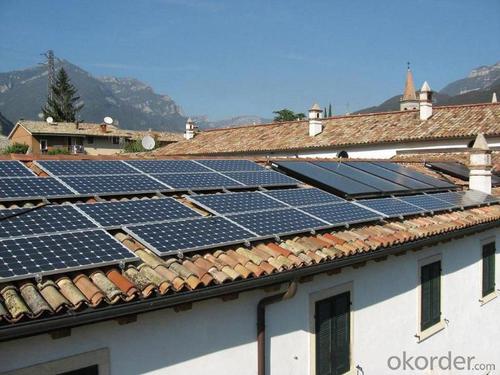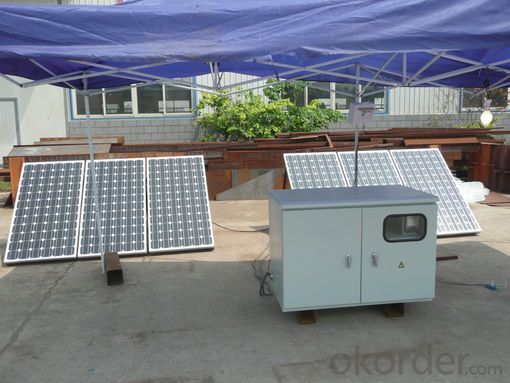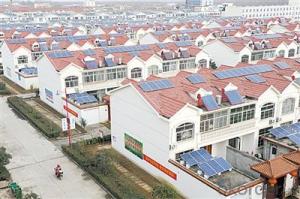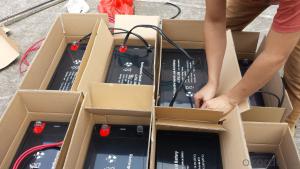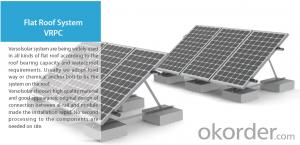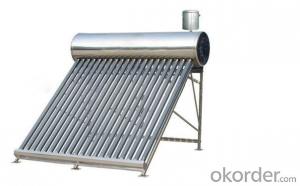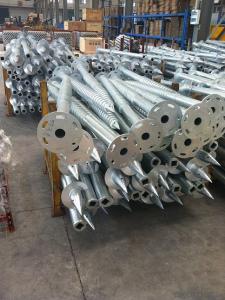PV Solar Energy Systems - Roof Solar Power System Hot Sale 2024 New
- Loading Port:
- Shanghai
- Payment Terms:
- TT or LC
- Min Order Qty:
- 500 watt
- Supply Capability:
- 2000000 watt/month
OKorder Service Pledge
OKorder Financial Service
You Might Also Like
Quick Details
| Quick Details | |||||
| Specification: | Normal | Application: | Home | Output Voltage (V): | AC110V/220V |
| Load Power (W): | 3KW | Solar Power (W): | 3KW | Work Time (h): | 48 |
| Cables: | 50m | Solar Panel Rack: | Optional | Battery Capacity: | 12V/200AH*8pcs |
| Controller Voltage: | 48V | Inverter Output Voltage: | AC220V/110V | Efficiency: | 90% |
| Inverter: | DC48V | Rated Output Capacity: | 3000W | Solar Panel Power: | 250w*12pcs |
| Solar Panel Type: | Crystalline Silicon PV Module | ||||
Packaging & Delivery
| Packaging & Delivery | |
| Packaging Detail: | using carton or wooden box as per customer's requirement. |
| Delivery Detail: | within 10~30 days for shipment depending on order quantity |
Excellent battery backup 300W to 10KW off grid solar system with grid power switch
Anern Advantage:
1) Over 10 year experience in clean energy line, business covering solar street light, solar garden light, off grid
solar system and on grid solar power system, etc;
2) Exporting for worldwide, with satisfied clients more than 50 countries;
3) Competitive price, excellent service, integrated certificate system;
We supply CE, RoHS certificates if you need
Welcome to visit our factory at any time.
Solar system advantages:
1. CE, ROHS approved.
2. High conversion efficiency, high-transmission rate.
3. Energy saving, environmental-friendly.
4. Advanced technology, strict quality control system.
5. Easy installation, safe operation, free maintenance.
6. Low MOQ, fast delivery time, long service life
Specifications:
| Ref No. | OFF-SGHP-3KW | |
| System Basic Information | Solar Panel Rated Output Power | 3KW |
| Suitable for Max Daily Power Consumption | 10KWH | |
| Rated Output AC Capacity | 3KW | |
| Solar panel | ||
| Type | Crystalline Silicon PV Module, A-class | 12pcs |
| Max Power | 250W | |
| Vmp | 30.5V | |
| Size | 1655*992*45mm | |
| Weight | 22.5kg/pc | |
| 25 years power output guarantee (Note: 2pcs panels connect in series) | ||
| Controller | ||
| Voltage | 48V | 1pc |
| Current | 60A | |
| Warranty | 1 year | |
| PWM high-efficiency charging controller, LED display, intelligent control; Temperature compensation, various protections. | ||
| Circuit Breaker | Used for protection of controller, installed between PV array combiner and controller | 1pc |
| Inverter | ||
| Input Voltage | DC48V | 1set |
| Output Voltage | AC220V/110V 1-phase | |
| Frequency | 50/60Hz | |
| Efficiency | 90% | |
| Note: This inverter provides grid power switch and battery charging functions. | ||
| Battery | ||
| Capacities | 12V/200AH per piece | 8pcs |
| Service life | 5 to 6 years | |
| Warranty | 3 years | |
| Solar panel rack | Flat-roof type mounting rack, steel material, anti-rust treatment | 1 set |
| (Other types of racks can be customized as per client's requirement) | ||
| Cable | 50m | |
| Connectors | 3-terminal connectors, used for panels connection in parallel | 6 set |
Product features:
1. Off grid solar power system is mainly used for application with relatively-small power consumption, and the areas have no grid network coverage, or grid power is unstable or outage condition.
2. It’s composed of solar panels, hybrid solar inverter, battery bank, solar panel mounting racks, and other accessories required fora complete home solar power system.
3. The battery bank gives a stable power output to the solar inverter which converts DC to AC to power loads, and provides power backup in rainy or cloudy days.
4. The solar panels generate electricity at daytime and charge the battery bank .
5. The off grid home solar power system provides grid power bypass in case of battery power shortage when sunshine is not enough.
6. All the off grid home solar power system configurations are worked out by scientific calculation and design.
FAQ
We have organized several common questions for our clients,may help you sincerely:
①what price for each watt?
it depends on the quantity, delivery date and payment terms,
②what is your size for each module? can you tell me the parameter of your module?
we have different series of panels in different output, both c-si and a-si. please take the specification sheet for your reference.
③Can you provide the peripheral products of the solar panels, such as the battery, controller, and inverter? If so, can you tell me how do they match each other?
Yes, we can, we have two companies for solar region, one is CNBM International, the other is CNBM engineering Co.
We can provide you not only the solar module but also Solar Cells, the off grid solar system, we can also provide you service with on grid plant.
④What is your warranty system?
Our product performance guarantees for 25 years
• 12 years guarantee for workmanship
• Timeliness of delivery
• Quality Products certified (TÜV, UL, CE, ISO)
⑤How do you pack your products?
We have rich experience on how to pack the panels to make sure the safety on shipment when it arrives at the destination.
⑥ Can you do OEM for us?
Yes, we can.
⑦How long can we receive the product after purchase?
In the purchase of product within three working days, We will arrange the factory delivery as soon as possible. The pecific time of receiving is related to the state and position of customers. Commonly 7 to 10 working days can be served.
- Q: Can solar energy systems be installed on parking lots or carports?
- Yes, solar energy systems can be installed on parking lots or carports. In fact, these locations offer ample space for solar panel installations, allowing for the generation of clean and renewable energy while also providing shade for parked vehicles. This dual-purpose use of space is increasingly popular and beneficial in terms of reducing carbon emissions and utilizing underutilized areas for sustainable energy production.
- Q: How does the installation of solar panels affect the building's resale value?
- Installing solar panels can positively impact a building's resale value. Potential buyers are increasingly interested in energy-efficient features, and solar panels can significantly reduce electricity costs. Additionally, solar panels demonstrate a commitment to sustainability, which appeals to environmentally conscious buyers. Overall, the installation of solar panels can make a building more attractive, potentially leading to a higher resale value.
- Q: Can solar energy systems be used in areas with limited access to solar energy demonstration projects?
- Yes, solar energy systems can still be used in areas with limited access to solar energy demonstration projects. While demonstration projects are valuable for showcasing the benefits and feasibility of solar energy, they are not a requirement for utilizing solar energy systems. With proper planning and assessment, solar energy systems can be installed and used effectively in areas with limited access to demonstration projects, helping to harness clean and renewable energy sources.
- Q: Can solar energy systems be used for powering water pumping systems?
- Yes, solar energy systems can be used to power water pumping systems. Solar-powered water pumping systems utilize photovoltaic panels to convert sunlight into electricity, which can then be used to power water pumps. These systems are cost-effective, environmentally friendly, and have proven to be reliable in remote areas where grid electricity is not available.
- Q: Are there any health risks associated with solar energy systems?
- There are minimal health risks associated with solar energy systems. The main concern is the potential for electric shock or fire hazards during installation or maintenance if proper safety precautions are not followed. However, with proper installation and regular maintenance, these risks can be effectively mitigated. Additionally, some solar panels contain small amounts of hazardous materials, such as lead or cadmium, but they are typically sealed and pose no risk unless the panels are damaged or improperly disposed of. Overall, when installed and maintained correctly, solar energy systems are safe and environmentally friendly.
- Q: Can a solar energy system be installed on a concrete roof?
- Yes, a solar energy system can be installed on a concrete roof. Concrete roofs provide a stable and durable surface for mounting solar panels. However, it is important to ensure that the roof structure can support the weight of the panels and that the concrete surface is suitable for installation. Consulting with a professional solar installer is recommended to assess the feasibility and determine the best installation methods for a concrete roof.
- Q: Can solar energy systems be used in areas with high seismic activity?
- Yes, solar energy systems can be used in areas with high seismic activity. However, additional precautions and engineering considerations need to be taken into account during the installation and design process to ensure the system's stability and safety. This may include using reinforced mounting structures, employing flexible wiring connections, and implementing seismic-resistant designs.
- Q: What is the impact of roof material on the performance of solar panels?
- The impact of roof material on the performance of solar panels is significant and should not be overlooked. The choice of roof material can greatly affect the efficiency and overall output of the solar panel system. Firstly, the color and reflectivity of the roof material can influence the performance of solar panels. Dark-colored roofs tend to absorb more heat, which can increase the temperature of the solar panels. High temperatures can decrease the efficiency of the panels and reduce their output. On the other hand, light-colored or reflective roofs can help to keep the panels cooler, allowing them to operate more efficiently. Secondly, the texture and material of the roof can affect the installation and positioning of the solar panels. Some roofing materials, such as slate or clay tiles, can be more fragile and require additional care and expertise during the installation process. Flat or smooth roofs made of materials like metal or asphalt make it easier to mount solar panels and adjust their tilt and orientation to maximize solar exposure. Furthermore, the durability and lifespan of the roof material should also be considered. Solar panels typically have a lifespan of 25 to 30 years or more. It is important to choose a roof material that can withstand the weight and potential impact of the solar panel system over its lifetime. Additionally, roof materials that require frequent maintenance or replacement may disrupt the solar panel system and incur additional costs. Lastly, the roof material can impact the overall aesthetics and integration of the solar panel system into the building's design. Different roof materials may require specific mounting systems or modifications, which can affect the visual appeal of the solar installation. It is important to choose a roof material that complements the appearance of the solar panels and enhances the overall look of the building. In conclusion, the impact of roof material on the performance of solar panels is significant. The choice of roof material can affect the temperature, installation, durability, and aesthetics of the solar panel system. It is crucial to carefully consider these factors to ensure optimal performance and longevity of the solar panels.
- Q: Can solar energy systems be used in powering theme parks or water parks?
- Yes, solar energy systems can definitely be used to power theme parks or water parks. Solar energy is a clean and renewable source of power that can provide a sustainable and cost-effective solution for meeting the energy needs of these establishments. Theme parks and water parks require a significant amount of electricity to operate attractions, lighting, water pumps, and other facilities. Installing solar panels can help reduce their reliance on conventional energy sources and decrease their carbon footprint. The large open spaces available in theme parks and water parks are ideal for installing solar panels, which can be mounted on rooftops, carports, or ground-mounted arrays. Solar energy systems can generate electricity by converting sunlight into usable energy through photovoltaic (PV) panels. These panels can be integrated into the infrastructure of the park discreetly and efficiently. The energy generated during the day can be used immediately to power rides, lighting, and other equipment, and any excess energy can be stored in batteries for use during periods of low sunlight or at night. Furthermore, solar energy systems can provide a reliable source of power and reduce the vulnerability of theme parks and water parks to power outages or disruptions in the grid. This is particularly important in areas prone to extreme weather events. By incorporating backup battery storage systems, solar energy can provide a constant and uninterrupted power supply even during emergencies. In addition to the environmental and reliability benefits, solar energy systems can also provide long-term cost savings for theme parks and water parks. While the initial installation cost might be higher, the operational costs are significantly reduced as the sun provides free and abundant energy. Over time, the savings on electricity bills can offset the initial investment, resulting in substantial cost savings for the park's owners. Overall, solar energy systems have the potential to revolutionize the power supply of theme parks and water parks. By harnessing the sun's energy, these establishments can not only reduce their environmental impact but also achieve long-term cost savings and enhanced energy reliability.
- Q: Are there any environmental impacts associated with solar energy systems?
- Yes, solar energy systems have some environmental impacts, but they are significantly lower compared to traditional fossil fuel sources. The production and disposal of solar panels can generate some waste and emissions, but these are relatively minimal compared to the ongoing pollution caused by burning fossil fuels. Additionally, land use for large-scale solar installations can impact local ecosystems. However, proper planning and implementation can minimize these impacts, and the long-term benefits of solar energy in reducing greenhouse gas emissions and mitigating climate change far outweigh any potential negative environmental effects.
Send your message to us
PV Solar Energy Systems - Roof Solar Power System Hot Sale 2024 New
- Loading Port:
- Shanghai
- Payment Terms:
- TT or LC
- Min Order Qty:
- 500 watt
- Supply Capability:
- 2000000 watt/month
OKorder Service Pledge
OKorder Financial Service
Similar products
Hot products
Hot Searches
Related keywords



